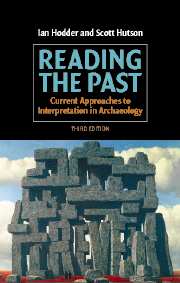Book contents
- Frontmatter
- Contents
- Preface to the first edition
- Preface to the second edition
- Preface to the third edition
- 1 The problem
- 2 Processual and systems approaches
- 3 Structuralist, post-structuralist and semiotic archaeologies
- 4 Marxism and ideology
- 5 Agency and practice
- 6 Embodied archaeology
- 7 Archaeology and history
- 8 Contextual archaeology
- 9 Post-processual archaeology
- 10 Conclusion : archaeology as archaeology
- Bibliography
- Index
Preface to the second edition
Published online by Cambridge University Press: 05 June 2012
- Frontmatter
- Contents
- Preface to the first edition
- Preface to the second edition
- Preface to the third edition
- 1 The problem
- 2 Processual and systems approaches
- 3 Structuralist, post-structuralist and semiotic archaeologies
- 4 Marxism and ideology
- 5 Agency and practice
- 6 Embodied archaeology
- 7 Archaeology and history
- 8 Contextual archaeology
- 9 Post-processual archaeology
- 10 Conclusion : archaeology as archaeology
- Bibliography
- Index
Summary
The first edition was written as a personal account in an uncertain world in which post-processual approaches had hardly had any impact. It represented my musings in the dark. Since that time there has been so much other publication (especially the books by Shanks and Tilley 1987a and b, Leone and Potter 1988, Gero and Conkey 1990, Tilley 1990a and b, Bapty and Yates 1990) and so much evaluation in relation to processual archaeology (e.g. the debate in Norwegian Archaeological Review 1989, Watson 1986, Earle and Preucel 1987, Preucel 1990) that the book needed to be brought up to date and my views tempered with the opinions presented in the literature.
The book still falls short of presenting a unified post-processual position since there are many diverging points of view now being expressed in theoretical archaeology. Initially post-processual archaeology was held together in the critique of processual approaches. This critique is now well established and post-processual archaeologists have turned more to the construction of the past. In doing so differences have become more stark but the discipline has been enlivened by the variety of perspectives. Nevertheless, the number of substantive post-processual interpretations of the past remains relatively small although several are about to appear (e.g. Hodder 1990a; Tilley 1990b). As more work is done so the differences and arguments will be brought into focus.
- Type
- Chapter
- Information
- Reading the PastCurrent Approaches to Interpretation in Archaeology, pp. xv - xviPublisher: Cambridge University PressPrint publication year: 2003

